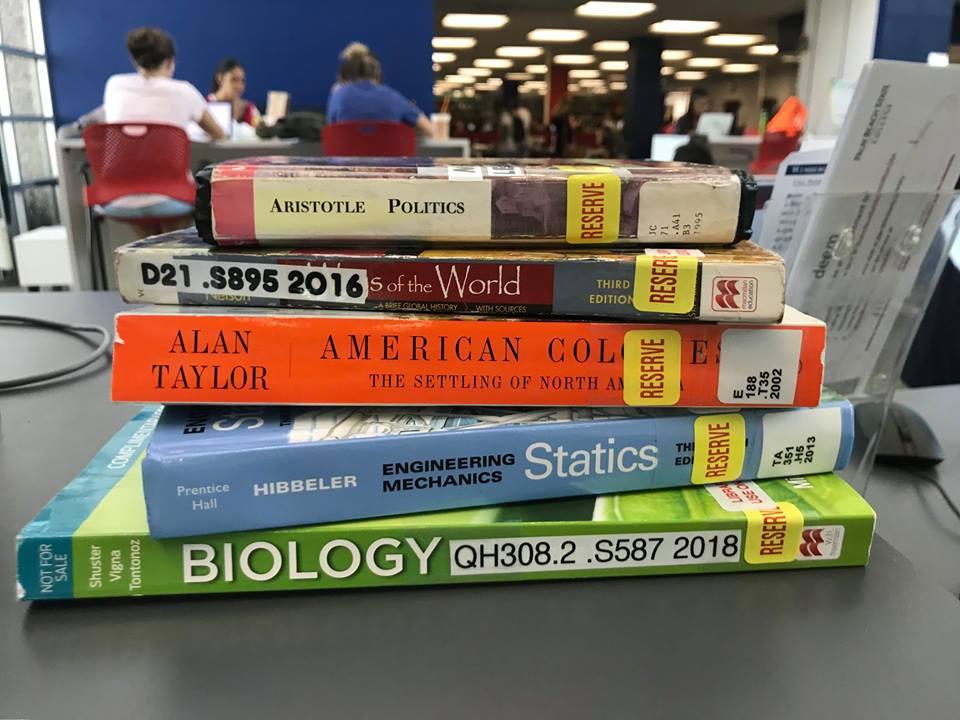
Photo credit: FAU Libraries.
Various studies show up to 66% of students do not purchase a required textbook for a course, and that students do not register a course if they are unable to afford its required materials. This impacts student persistence, graduation rates, and completion if they are taking fewer courses.
To help students persist and make higher education more affordable, Florida Atlantic University and the State of Florida have textbook affordability initiatives. They encourage faculty and instructors to use free and low-cost learning materials to support student learning. See the following for information, resources, and ways you can support these initiatives.
For Students
The following services provide FAU students with assistance in borrowing or purchasing textbooks or course materials:
- Short Term Advance Program—FAU Financial Aid: Students can apply through an online form to buy textbooks due to unanticipated living expenses. See its Terms and Conditions for details.
- Follett Price Match Guarantee—FAU Bookstore: Did you find a lower price for a textbook? The FAU Bookstore may match the price; conditions apply.
- Textbook Reserves: On a short-term basis, FAU students can borrow available textbooks through the Boca Raton campus library. Some are available in print while others may be e-books. See the Textbook Reserves webpage for available titles.
- The RISE Program Book Stipend: FAU students in the RISE Program (Reaching Individual Success and Empowerment) who successfully complete program success points may receive a stipend.
- Sandler School of Social Work Lending Library: FAU students with a social work major can apply for this book loan program.
- Free eBooks and Audiobooks (Research Guide)
- Free Textbooks (Research Guide) or Free and Low-Cost Textbooks (Affordability Counts/ FL SUS / FCS)
- Find Open Educational Resources (Research Guide)
for faculty and instructors
- Follett Textbook Access Program: FAU Follett Bookstore and various publishers offer this program that delivers print and digital course materials at a substantial discount or before the first day of class.
- Canvas: Follett Discover: Faculty and instructors can use Canvas to adopt Open Educational Resources (OER) in their courses, regardless of their delivery. Log onto Canvas and go to “Resources” to see OpenStax and other OER materials to use in courses.
- Negotiate Textbook Access Codes. Contact your textbook's publisher or representative to inquire about negotiating costs and access. Some FAU professors have successfully done this for their courses or for students with financial need.
- Textbook Reserves:
- Donate Your Copy. Faculty and instructors may donate their textbook or required course readings and place them on Textbook Reserves. See its Faculty Guidelines.
- Request a Library Purchase. The library may be able to purchase your textbook based on its cost and availability. Contact your library liaison or make your request at the Materials Suggestion Form.
- Library-Licensed Materials: Some textbooks, readings, or course materials may be available through the FAU Libraries. See your departmental library liaison to identify or acquire books, ebooks, streaming video, and other materials for instruction.
- Consider Open Educational Resources (OER): OER is defined as teaching and learning materials that can be freely used or reused at no cost that can include textbooks, learning objects, and courseware. OER typically makes learning materials and objects available with minimal barriers or costs.
University Policies:
- Procedures for Selecting Textbooks and Instructional Materials for Affordability (FAU Office of Provost, 2018): This memo provides guidelines and deadlines for textbook selection.
State of florida textbook affordability initiatives
The State of Florida is interested in textbook affordability and other measures to encourage the use of free and low-cost learning materials to support student learning and decrease their costs of education. See the following links for additional information on its past and current initiatives.
State-Level Initiatives:
- Textbook Affordability (Florida Department of Education): See FLDOE’s recommendations for textbook affordability and links to current state policies and legislation.
- 2025 Strategic Plan for Online Education (State University System of Florida): See the 2022 report for Goal 2, Strategy 2.1 for the SUS’s plan for eTextbook affordability.
- An Action Plan for Building a Statewide Infrastructure to Support OER in Florida’s Public Institutions of Higher Education: The final report of the Open Access Textbook and Educational Resources (OATER) Task Force: A 2016 report for Florida Virtual Campus (FLVC).
- Florida’s Zero Textbook Cost Course Indicator Overview (FloridaShines Distance Learning and Student Services)
- Student Textbooks and Course Materials Surveys and Information (FloridaShines Distance Learning and Student Services)
State Statutes:
- Florida Statutes, 1006.73(2)(e): Recommendations for textbook affordability and the use of OER or openly available, low-cost materials.
- Florida Textbook Affordability Statute (History): The history of Rule 61-14.092, Textbook Affordability is outlined in the Florida Administrative Code and Florida Administrative Register. See the background and actions taken at the state-level regarding textbook affordability.
 FLORIDA ATLANTIC UNIVERSITY
FLORIDA ATLANTIC UNIVERSITY
